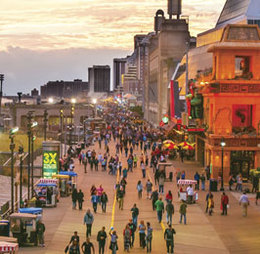
As casinos close and tourism dollars dwindle, Atlantic City is betting the future on reinventing itself once again.
Don Guardian is frequently seen making his way through Atlantic City, wearing a bow tie and a wide smile. He’s cool, calm and collected; his demeanor never cracking even while everything around him appears to be crumbling.
It’s a remarkable outlook for Guardian, a 25-year Atlantic City resident who took office as mayor last January and has been sitting in the front seat of the town’s biggest roller coaster ride ever since. “This year has been very challenging. There have been no easy days,” Guardian freely admits, before adding, “I don’t know anything besides [the struggles] we are going through now.”
This year, four casinos, including The Atlantic Club, Showboat, Trump Plaza and Revel—a $2.4 billion dollar ultra-luxe property once pegged as the savior to A.C.’s recent struggles—have closed. While Revel has since been auctioned off to Brookfield Property Partners for $110 million, rumors continue to swirl that Trump Taj Mahal could be next on the chopping block.
What Atlantic City is going through now—casinos shuttering their opulent doors, staggering unemployment rates and overall future uncertainty—is similar to the mood in A.C. following World War II, when the tourist destination began to become unglued as would-be visitors hopped on planes, trains and automobiles for other leisurely destinations where they could empty their wallets, and the seaside resort quickly become an afterthought.
As a result, the population dropped by nearly 19,000 people. With the tourism business struggling and less residents to keep things afloat, the economic situation began to worsen.
That’s when the state bet the future on legalized gambling. Voters passed a referendum in 1976 that would allow gaming. A year later, the Casino Control Act made its way through legislature with the purpose of using gaming to not only spike tourism but also to bolster development. In 1978 the dream became a reality when Resorts was the first casino to open. Less than a decade later, there would be a dozen casinos across town. Business had ballooned, but it appears no one saw the pin that would pop it coming.
“With gaming, Atlantic City put all its eggs in one basket. That never makes a whole lot of sense,” Guardian says.
A BLIND EYE
A slumping economy certainly contributed to A.C.’s recent downward spiral, but talk to those who know and the overriding contributing factor was ignorance on behalf of the casinos that couldn’t see beyond the piles of money they were once generating during the ’80s and ’90s from gaming. Other areas like convention business, fine dining, retail, and family entertainment were neglected, and the city outside gaming was not being further developed. Add to that aging infrastructure being largely ignored, and the blight began to settle in.
“I believe that Atlantic City was too much of a one-industry city,” says New Jersey Senate President Steve Sweeney. “For too long, the city relied almost solely on gambling revenues to keep the engine running. That format was bound to run into problems eventually.”
At least one former casino operator agrees with the notion that Atlantic City turned a blind eye to what was happening around them.
“Complacency can cause deterioration,” says business mogul Donald Trump, who owned several properties in Atlantic City before leaving town in 2009. “A lot has gone wrong. Bad decisions made by those with political agendas that would not benefit Atlantic City or its citizens.”
Although no longer having any skin in the game, Trump helped bring renewed vitality to A.C. during his run, hosting star studded shows and major boxing matches. Lately, he has been very outspoken of Atlantic City’s struggles, especially after Trump Plaza closed its doors and fears that Taj Mahal could be next in line.
When Trump resigned from the board of Trump Entertainment Resorts Inc., an agreement allowed the properties to keep his name for branding purposes. However, he recently sued and won a judgment to have his name taken off the shuttered Trump Plaza while it sits vacant.
When the city was making money hand over fist, it was easy to isolate itself. But those days are long gone now, with the influx of casinos popping up in Pennsylvania, Connecticut, Maryland and elsewhere. Atlantic City didn’t take the threat of competition seriously, and when they had no choice but to take notice, it was too late. They were no longer the only game in town.
“Everyone talks about the demise of Atlantic City, but the fact of the matter is we are victims of our success,” says Sen. Jim Whelan, the city’smayor from 1990 to 2001. “The casinos came along and tens of thousands of jobs were created and millions were poured into the economy through construction jobs, taxes, etc. So everyone wanted in. There’s a reason why Pennsylvania and Maryland and others got into gambling.”
At its peak, Atlantic City casinos employed more than 40,000 people and gaming revenue reached $5.2 billion dollars. But when the gaming market changed A.C. decided to play out their hand. Today, gaming figures are a little more than $2 billion. Still an eye-popping number, but a substantial decrease nonetheless.
Susan Thompson, deputy executive director of Casino Reinvestment Development Authority (CRDA), is quick to point out that the loss of revenue isn’t solely systematic of Atlantic City, but rather a decline in gaming as a whole.
“The reality is the industry and what’s occurring is not just an Atlantic City story, it’s a national gaming market story. Unfortunately, Atlantic City is a great story to tell because it has a history,” Thompson says.
The loss of revenue translates to the loss of casinos and ultimately the loss of jobs. More than 8,000 people are currently out of work and with the options along the Boardwalk dwindling, the human impact of these closures has become one of the biggest byproducts as folks look for ways to make ends meet.
“Our members are largely angry,” says Ben Begleiter, spokesperson for UNITE HERE Local 54 which represents a third of the casino workers in Atlantic City. “They’ve devoted years and years to these companies and now rather than be controlled by casino companies that reinvest in the property, they are owned by Wall Street tycoons who haven’t by in large reinvested and their solution for increased competition is to shut down properties rather than compete.”
To help provide assistance to the displaced workers, Local 54 partnered with the state’s labor department and various county and city organizations to create a resource center to make sure basic needs were being met. Roughly 3,500 workers were helped in areas like applying for unemployment as well as heating and food assistance.
The collaborative efforts to assist the workers are just one of the latest examples of leadership and the rank and file coming together in ways not often seen in a city where political agendas and personal goals were often prioritized. Guardian has lent his support to Together AC, a collection of religious, business, union and civic organizations with the purpose of financially helping laid-off workers with housing and utility bills, even tuition assistance.
“People are coming together more than ever. There’s a real sense of we got to figure this out and move forward,” says Begleiter.
“This is a crisis and that tends to bring people together,” echoes Whelan. “I think the political leadership is lining up in ways we haven’t in the past. Crisis presents opportunity; hopefully we won’t let this opportunity go to waste.”
ALL BETS ARE OFF
After years of stalled construction and posturing by developers and city officials, when Revel finally opened its doors on April 2, 2012, Gov. Chris Christie called the town’s first new casino since 2003 a “game changer” that would mark a “turning point” for Atlantic City.
A little more than two years (and two bankruptcies) after that April day, the $2.4 billion building closed, a mere 24 hours after the adjacent Showboat turned off its lights. Today the vacant Revel stands as an expensive reminder of the lessons Atlantic City has been learning the hard way of late.
The property was auctioned off to Brookfield Property Partners last month. The group, which operates the Hard Rock Hotel and Casino in Las Vegas and the Atlantis Paradise Island in the Bahamas, believes they have the expertise to succeed where others have failed—of course at a fraction of the cost thanks to an attractive valuation.
“We are excited about owning the newest and highest quality asset in Atlantic City,” says company spokesperson Andrew Willis. “This acquisition is consistent with Brookfield’s history of contrarian investing, on a value basis.”
The company is vague on their plans for the future, or even if the Revel name will stick, but said they do anticipate material synergies between their three properties. While it remains to be seen if Revel can rebound, the fact that it appears to be making its way back in the game is encouraging. Other properties that have closed could also see light at the end of the tunnel.
“These properties are being marketed,” says Thompson. “Brookfield is a world-class company; they would not have entered the market if they thought it was dead. This is the best time to invest in Atlantic City.”
Gov. Christie did not respond to repeated attempts for comment on this story, but did recently organize a closed-door business summit with city officials, union reps and casino operators. It was a meeting of the powers that be to pool their resources in search of coming up with a definitive action plan to help navigate A.C. through the rocky waters.
Of course, it’s not doom and gloom at every casino. The Borgata helped to bring a new feel to Atlantic City when it opened in July of 2003. It was modern and had an almost Las Vegas appeal that was considerably glitzier than some of the aging properties around town. They brought the celebrity chef to A.C., along with new forms of nightlife and entertainment. They were hip to the fact that you needed more to draw visitors in besides penny slots and poker tournaments. It should have inspired others to follow suit, but the chain reaction was slow. That was until others saw the success the new kid on the block was having.
“Atlantic City didn’t evolve for the first five to six years we were open,” says Joe Lupo, Borgata’s senior vice president. “It was Borgata that made everybody look at their operations and understand that a full-fledged resort that offers all the amenities that we do will create more visitation.”
Since opening its doors the Borgata has spent $25 million a year reinvesting in the building and growing its offerings. “We really moved the needle and showed how to position a property differently than just a gaming resort,” says Lupo.
As other operators began to put more capital into their properties, signs of change were more evident. The Tropicana opened The Quarter, a dining and retail hub that also features spa and nightlife options. Caesars opened The Pier Shops, with well-heeled brands like Louis Vuitton and Gucci and Stephen Starr-backed restaurants. (The Pier Shops are now half empty and were recently sold to Philadelphia developer Bart Blatstein). Taj Mahal added a hotel tower and underwent an extensive renovation. In what seems like a rather obvious move, properties began to embrace their seaside location and opened beach bars and lounges.
Voorhees’ Jessica Cantz has been going to A.C. since 1985 and says the upgrades around town are not only noticeable, but they have made an impact when comparing them to some of the more dated places in town. Without something memorable or unique, folks like Cantz who don’t regularly gamble have no reason to come back.
“Some places haven’t been updated and that would bring a lot of people back,” she says. “You go to Harrah’s, there are a lot of people there. You go to Golden Nugget… a lot of people there. Borgata—a lot of people there.
“You have to have choices for people; in case they lose their money,” she quips.
OPEN FOR BUSINESS
With all the negative headlines coming out of Atlantic City these days, you’d have a hard time believing they are still open for business. In fact, while gaming revenue is on the decline, figures show there’s been an uptick in money being spent elsewhere like at The Walk outlet mall or for tickets to see the Atlantic City Ballet at The Claridge Hotel, their new home on the Boardwalk.
“People are talking about Atlantic City as if it’s gone,” says the CRDA’s Thompson. “Go to any location and ask them if they’d be interested in a $2 billion industry. They’d say absolutely.”
The ballet is just one of the latest examples of officials trying to drive people into town. The idea being that once they are here, if you can give them enough reason to stay, they will. Or better yet, they’ll keep coming back. And that means keeping an increasing eye toward more family friendly events as well. Free concerts from Blake Shelton and Lady Antebellum this past summer drew more than 140,000 to the beach. The return of Miss America has been a boost. There’s talk of possibly adding water parks as well. The thinking is that while other places like Pennsylvania offer gamblers an alternative, they cannot offer the resort experience that A.C. can.
“The other locations have grabbed that convenience gambler. We want to offer a full range of dining and entertainment experiences, so they sit not just for an hour or two in a casino, it’s a full day. And if we really hit it out of the ballpark, they book a hotel room. [The other locations] cannot offer that and will not be able to offer that,” Thompson says.
One lingering concern in recent years has been that of safety. Many folks didn’t feel safe to walk the boards at night or the streets which are lined with pawn shops, cash for gold stores and other dilapidated storefronts.
“During the ’90s we were aggressive about demolition, others came in [to office] and weren’t as aggressive,” Whelan says, noting that conversations of eminent domain should be taking place. “We didn’t get the job completed, so as a result, there are a lot of sections of the city where buildings need to be demolished. Some of the beach blocks from Resorts to Park Place, there’s been no development in that area during the casino era. The Boardwalk over there is kind of OK, but by and large its vacant ground and substandard buildings. That’s part of the Boardwalk. That’s part of the Monopoly board. We have to address that.”
To combat other safety concerns the city has made strides like adding lighting to the Boardwalk and partnering with the attorney general’s office to prioritize and manage fiscal involvement. Expanded budgets have allowed for the hiring of additional ambassadors that roam the tourism district 16 hours a day. The Boardwalk has seen al fresco dining options gain in popularity. Police presence has also been increased and it has resulted in a 40 percent drop in violent crime the first six months of 2014.
These are all steps in a positive direction according to Guardian and ones that should allow A.C. gain back some visitors they’ve lost along the way.
“It takes a while for perception to catch up with reality,” he says. “Atlantic City is a lot safer than it has been. You have to come down and kick the tires and see we made a whole lot of changes.”
And the city continues to explore new areas to diversify its tourism reach along with non-tourist business, which should allow the casinos to get healthier. That belief of opportunity is why people like Guy Fieri and Gordon Ramsay are opening restaurants in town instead of being scared off by the news.
“It will be dependent upon what happens to the [closed] properties and the type of product that is created,” says the Borgata’s Lupo. “I was around in Las Vegas when older properties were being blown up and rebuilt by Steve Wynn. It showed the resurgence. I believe we can have a resurgence in Atlantic City. Whether a casino or something different that drives volume here, it will help the city.”
While other things like the addition of online gaming and Gov. Christie’s push for sports betting in A.C. look to make further impact, Sen. Sweeney has proposed building casinos in the northern part of the state to help stabilize the city and recapture the gaming market.
“That doesn’t mean we are giving up on Atlantic City. Quite the contrary. Any expansion to North Jersey would have to include the redirection of revenue from the new casinos to Atlantic City to support the city’s reinvention as a tourist destination that includes gaming, but isn’t reliant on casinos alone,” Sweeney says.
THE FUTURE
One direction that has been helping underperformed areas find new life has been the push of education and medicine. Ed and meds are opening new doors in Camden for example, so why not A.C.?
Mayor Guardian agrees, which is why he’s excited to be working with Richard Stockton College of New Jersey to open a campus for 10,000 students in Atlantic City, a move he hopes to announce by the end of this year. It’s a move that could have a tremendous ripple effect on the future, one that Guardian says will rely less on tourism and more on the community.
“That’s the type of vision and change and the new beginning that we need to move forward,” Guardian says of the plan, which would bolster the ability to cultivate land for research and development.
It’s clear there are plans in place and a commitment to exhaust every opportunity to make them work. It remains to be seen if that determination will pay off, but it certainly has some people bullish on the future.
“Atlantic City has a great future, but it will be a future that will be different than the past,” says Sweeney. “This is a time of transition. There’s no denying that the casino closings and job losses are hard on the city and its residents, but I believe Atlantic City’s best years are ahead. Now is the time to reinvent Atlantic City in ways that will sustain long-term prosperity. We need a more diverse economy that provides good jobs and contributes to the city’s well being.”
That is welcome news to the many unemployed workers put off by years of empty promises. “For a lot of our members, they believe there will be second lives to some of these casinos that have closed and hopefully that happens in the short term and it doesn’t take a few years,” says Begleiter.
Even the outspoken Trump feels there’s good news around the corner. It’s enticing enough to possibly even persuade him to dip his toes back into Atlantic City’s water.
“Never say never,” Trump says of a potential return to town. “I like Atlantic City and would do what I could to help, but a lot of things need to be remedied first.”
Casino operators are feeling the tide change as well. “There’s finally a real sense of hope, but it’s not going to happen overnight,” says Lupo.
Senator Whelan agrees: “There’s a lot of pain ahead of us over the next couple of years as we try and get back to a more level economy.
“One of the mistakes made now and originally in A.C.’s decline in the post WWII era is the sense of OK, we are done now. Things are good. Go back to 2005, casinos were making money, people were working. You are never done; tourist cities can never be done. You always have to move forward and make changes.”
Guardian says he’s ready to make the necessary changes and feels he has the support to do so. A known coalition builder never afraid to reach out, he knows he’s the man to get the job done, even if he didn’t always feel that way.
“I came to Atlantic City 25 years ago and people asked me why don’t I run for mayor? I told them in my opinion the right person to be mayor is someone who is comfortable where they’re at in their life and can devote themselves to running the city and not use it as a stepping stone [for their career],” he says.
“For 20 years I couldn’t find that person and then I woke up last year and realized I was that person.”
What’s new?
A look at recent and upcoming changes around Atlantic City
Celebrity chef Gordon Ramsay will take over the former Mia at Caesars with Gordon Ramsay Pub & Grill and feature a menu heavy on British pub fare and more than 30 beers on tap.
Golden Nugget has joined other casinos in town by offering online gaming. The property has partnered with KGM Gaming to offer poker, mega ball and slot games digitally.
While celebrating the 10th anniversary of The Quarter, Tropicana is undergoing a $35 million project that will include hotel renovations, the addition of a new fitness center and the creation of an interactive light and sound display along the Boardwalk.
More than $100 million in upgrades will be made to Boardwalk Hall and the Convention Center by the Casino Reinvestment Development Authority. Harrah’s has broke ground on the largest meeting and conference facility in the Northeast. The 250,000-square-foot facility, half of which will host corporate meetings, will target conventions and tradeshows.
Spring 2015 is the target date for the opening of a Bass Pro Shop in Atlantic City. The $34 million project includes an aquarium and 86,000 square feet of retail space.
The Public Market is a 30,000- square-foot indoor market expected to open later this year, featuring goods from local farmers and merchants and will house restaurants as well.
Since last summer Bally’s has welcomed two new restaurants into the fold. Food Network star Guy Fieri’s Chophouse and family-style Italian chain Bucca di Beppo.
The Borgata Buffet will be undergoing renovation this December. The space will be closed on Dec. 1 and reopen as a completely redesigned space on Christmas Day.
Steel Pier is undergoing a $10 million renovation project that will produce new rides, food and drink, and the East Coast’s largest observation wheel.
Published (and copyrighted) in South Jersey Magazine, Volume 11, Issue 8 (November, 2014).
For more info on South Jersey Magazine, click here.
To subscribe to South Jersey Magazine, click here.
To advertise in South Jersey Magazine, click here.












